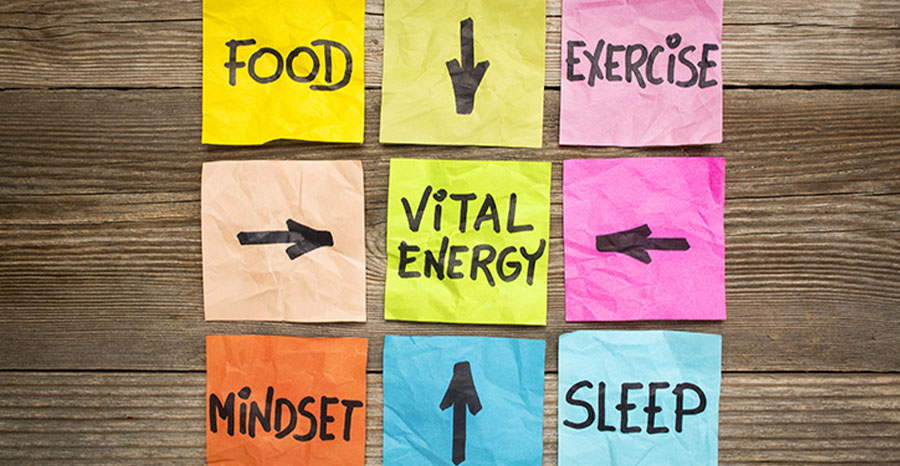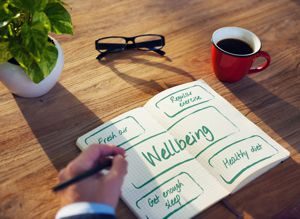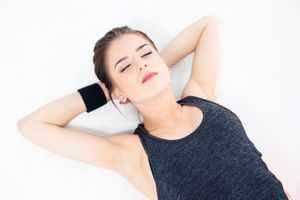
Diet, Exercise and Sleep: Achieving Peak Performance, Part 2 of 2

Along with exercise and a healthy diet, our body needs proper rest to achieve peak performance.
Last week we explored the importance of diet and its impact on exercise results in Part 1 of this series. Today we’ll look at the link between exercise and sleep and see how shorting ourselves on rest will not only undermine our training efforts but have a very negative effect on our quality of life.
“Sleep is for the weak.”
“I’ll sleep when I’m dead.”
Along with exercise and a healthy diet, our body needs proper rest to achieve peak performance.
Are You Sacrificing Sleep?
Sleep has long been the thing that people who want more productive hours in their day will sacrifice to buy time. As we’re about to see, this behavior is extremely unhealthy, actually leads to lower productivity, and severely undermines our efforts to achieve our fitness goals. Aside from the obvious problem that we’re less likely to train when we’re tired, lack of sleep causes a number of more insidious effects.
You’ve probably heard that adults require 8 hours of sleep per night. This is an oversimplification. Everyone is different. Some people can function just fine on 7 hours, while others need 9 or more. Only experimentation can tell you how much sleep you personally need to be healthy, happy and mentally alert however there are guidelines you can start from. Scientists at the National Sleep Foundation in Maryland, USA provide the following ranges:
Teenagers (14-17): 8-10 hours
Younger adults (18-25): 7-9 hours
Adults (26-64): 7-9 hours
Older adults (65+): 7-8 hours
As you can see from this, if you’re an adult and you’re getting less than 7 hours per night, chances are very good that you are sleep deprived. Similarly, if you’re sleeping more than 9 hours per night, you’ll be groggy, have lower energy and will be more prone to depression.
Sleep deprivation can also lead to lowered mental acuity, poor job performance, high-risk behaviors caused by impaired judgment, depression, anxiety, poor self-esteem, and an increased susceptibility to illness and obesity.
Let’s take a look at the science.
The Effects of Sleep Deprivation on Judgment
The amygdala, an area deep in our brain, is responsible for regulating our emotions. Brain imaging tests done on sleep-deprived subjects showed that activity in this area of the brain was far less stable than in subjects who were getting regular sleep. In short, a lack of sleep makes it nigh impossible to control our emotional state. This has a widespread effect. We will become more irritable, prone to losing our temper, less empathetic, and more likely to have a negative view of others and ourselves. This impacts our fitness goals as it becomes much harder to stick to our workout schedule and make good food choices.
Due to the impact on the amygdala, sleep deprivation mimics the impaired judgment that comes with alcohol consumption. We’re simply far more likely to make bad decisions when we’re sleep deprived. Casino owners have known this and used it to increase their profits for decades. The loud noises, bright lights and lack of windows in casinos create an environment engineered to throw sleep patterns off and keep people awake well beyond the point where they should have gone to bed. This results in patrons who are far more likely to take foolish risks. For our fitness and exercise goals, it means we’re much more likely to skip workouts because negative emotions are clouding our judgment and robbing us of the ability to see the bigger picture.
Sleep Deprivation and Depression/Anxiety

A lack of sleep has a profound impact on our mood and outlook on life.
Studies have shown that insomniacs are 10 times as likely to suffer from clinical depression and 17 times as likely to have clinical anxiety disorders. This actually gets even worse, as there is a disruptive feedback loop between depression, anxiety and poor sleep as both depression and anxiety may themselves cause sleep disorders.
Sleep, or lack of it, has a profound impact on our mood and outlook on life.
This is an area though where we need to be careful, and if you are suffering from a mix of sleeplessness and anxiety and/or depression it is imperative that you see your doctor. In some cases, depression can be effectively treated by reducing the hours of sleep, although this is often in the case of people who are sleeping too much (i.e. more than 9 hours per night). On the other hand, if you’re sleeping less than 7 hours per night, it is possible that lack of sleep is causing your depression or anxiety. In either case, you should see your doctor.
Anxiety and depression will negatively affect our plans to train as both of these conditions make it very hard to stick to a schedule. Those suffering from depression may simply find they don’t care enough to work out, even though exercise would definitely help alleviate symptoms, and anxiety disorders make it difficult to focus or act on things we know we should do.
Sleep Deprivation and our Immune System
Our body isn’t just resting while we sleep. It’s literally recharging. There are a number of hormones and brain chemicals that are released while we sleep that boost our immune system. Scientists have found that even short-term sleep deprivation can result in a marked decrease in these disease-fighting chemicals. Obviously, if we’re sick, we’re not exercising so this is another area where sleep affects our fitness goals and causes a negative feedback loop. We don’t work out because we’re sick, which results in our body being in poorer shape and thus more susceptible to disease.
Do note that increasing sleep beyond 9 hours per night will not provide any added benefit to our immune system, and might actually make us more likely to get sick.
Sleep Deprivation and Recovery

Sleep is the period during which our body repairs damaged cells and replenishes healthy levels of hormones and neurotransmitters.
Even if you’re not suffering from any of the emotional or mental side effects of sleep deprivation, lack of proper sleep will still have a severe negative impact on achieving your fitness goals. Exercise, especially intense exercise, causes damage to your body. Your body gets stronger in response, but only if it’s getting the rest it needs to heal the damage.
Without proper rest, our body can’t repair the damage caused by exercise. Instead of getting stronger, we end up breaking down muscle and connective tissues.
While this is anecdotal, I can tell you from personal experience that poor sleep definitely impacts my own training. When I’m sleeping well, I see steady progress in strength, muscle tone, and endurance. On the other hand, when I’m lacking in sleep, it doesn’t matter how hard I train or how disciplined my diet, I see my strength and endurance steadily dropping.
If you’re not getting enough sleep and you’re finding that you just aren’t seeing any progress in your training, try committing yourself to proper sleep for at least two weeks. This means going to bed and getting up at the same time every day, even on weekends, and ensuring you’re getting between 7 and 9 hours of sleep. You will likely be very pleasantly surprised at the positive impact this will have, not only on your training but your overall mood and outlook on life.
Will Dove
Latest posts by Will Dove (see all)
- Body Weight Training 2.0: Calisthenics - 22 Apr
- All About Protein Powders - 9 Apr
- Top 5 Fitness Trends for 2019 That You Should Try - 30 Mar
